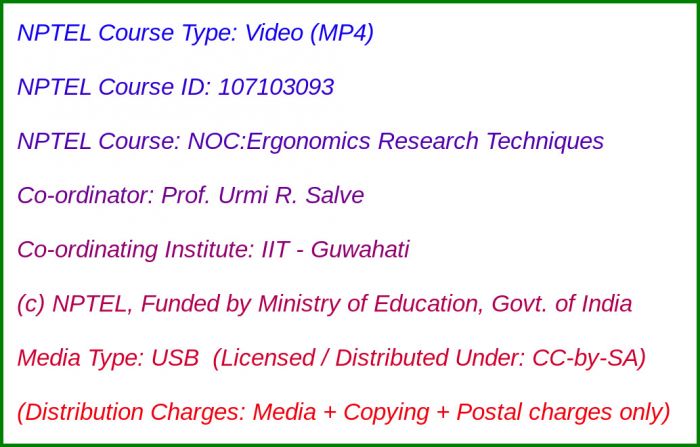
Media Storage Type : 32 GB USB Stick
NPTEL Subject Matter Expert : Prof. Urmi R. Salve
NPTEL Co-ordinating Institute : IIT Guwahati
NPTEL Lecture Count : 42
NPTEL Course Size : 6.6 GB
NPTEL PDF Text Transcription : Available and Included
NPTEL Subtitle Transcription : Available and Included (SRT)
Lecture Titles:
Lecture 1 - Course Introduction
Lecture 2 - Introduction
Lecture 3 - Plan for Identifiering av Belastnings faktorer (PLIBEL) method
Lecture 4 - Ducth Musculoskeletal Questionnaire (DMQ)
Lecture 5 - Musculoskeletal discomfort National Institute for Occupational Safety and Health (NIOSH)
Lecture 6 - Job Strain Index (JSI)
Lecture 7 - Ovako Working posture Analysis System (OWAS)
Lecture 8 - Rapid Upper Limb Analysis (RULA)
Lecture 9 - Rapid Entire Body Analysis (REBA)
Lecture 10 - Manual handling Assessment Charts (MAC)
Lecture 11 - Manual handling Assessment Charts (MAC)
Lecture 12 - Manual handling at work
Lecture 13 - Quick exposure checklist (QEC)
Lecture 14 - National Institute for Occupational Safety and Health (NIOSH) Lifting equation
Lecture 15 - Borg scale and Rodgers muscle fatigue analysis
Lecture 16 - Snook's Table
Lecture 17 - Lumber motion monitor (LMM)
Lecture 18 - Occupational repetitive action methods (OCRA) methods
Lecture 19 - Hand Arm Risk assessment Method (HARM)
Lecture 20 - Assessment of repetitive tasks of the upper limbs (ART)
Lecture 21 - Risk Assessment of Pushing and Pulling (RAPP)
Lecture 22 - Movement and Assistance of hospital patients (MAPO) method
Lecture 23 - Introduction
Lecture 24 - Observation, interviews and verbal protocol
Lecture 25 - Focus group
Lecture 26 - Hierarchical task analysis
Lecture 27 - Allocation of function methodology
Lecture 28 - Allocation of function methodology
Lecture 29 - Critical decision method
Lecture 30 - Systemic human error reduction and prediction approach (SHERPA)
Lecture 31 - Task analysis for error identification (TAFEI)
Lecture 32 - NASA task load index (TLX)
Lecture 33 - Multiple resource time sharing model
Lecture 34 - Critical path analysis
Lecture 35 - Situational awareness global assessment technique
Lecture 36 - Electroencephalogram (EEG)
Lecture 37 - Eye tracking
Lecture 38 - Human Error Assessment and Reduction Technique (HEART)
Lecture 39 - Cognitive Reliability and Error Analysis Method (CREAM)
Lecture 40 - Measurement of thermal conditions at workplaces
Lecture 41 - Mesasurement of different environmental factors - Part I
Lecture 42 - Mesasurement of different environmental factors - Part II

